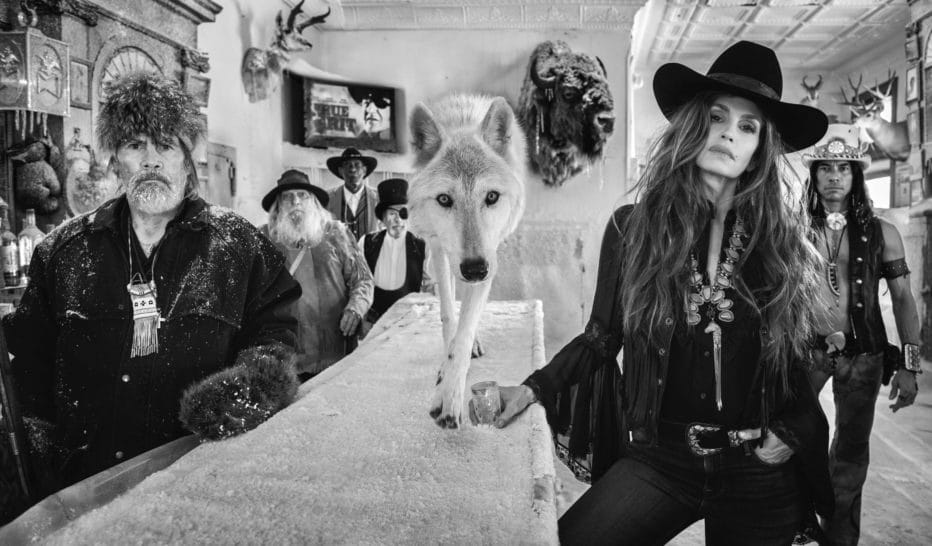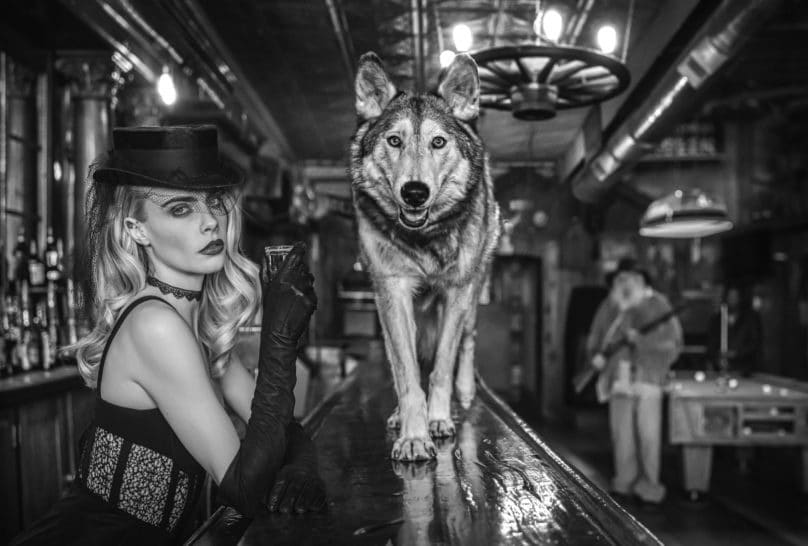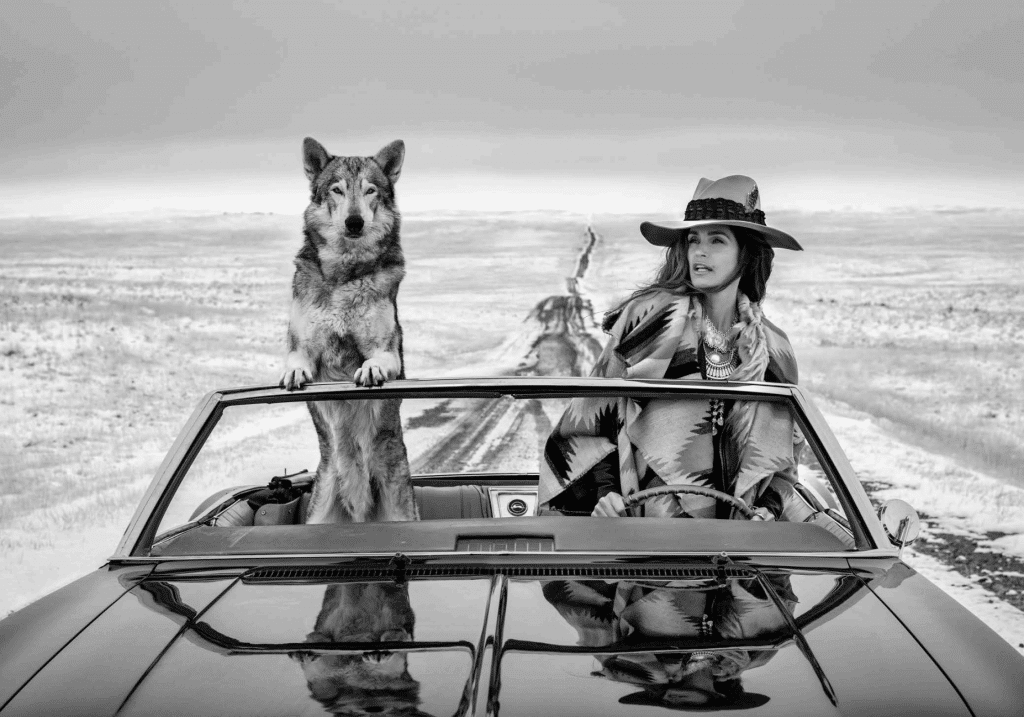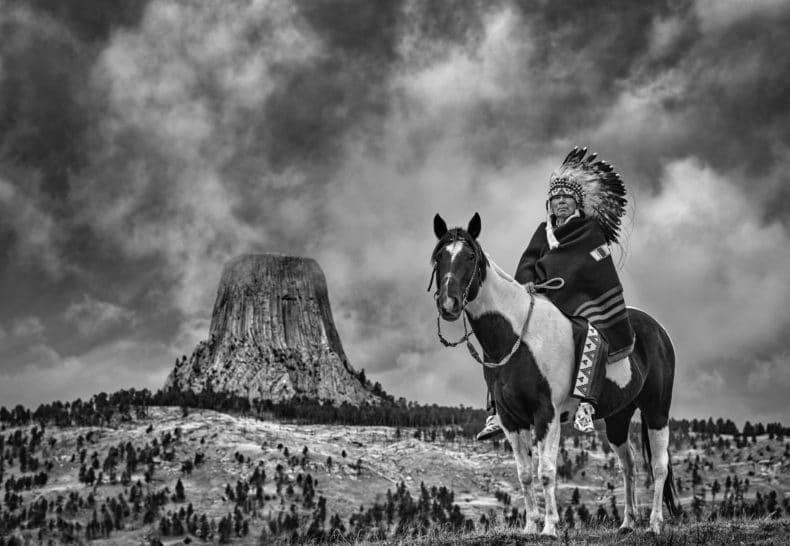Yarrow traveled to Montana and Wyoming to create these quintessentially American images.
British photographer and conservationist David Yarrow is celebrated for his black-and-white photos of far-flung territories, endangered landscapes, and nature’s most majestic creatures. This fall, after a long quarantine, the photographer set off for Wyoming and Montana to shoot his new series “The Wild West.” Headlined by supermodels Cindy Crawford and Cara Delevingne, the series captures quintessentially American scenes from the cross-country road trip, which culminated at a Western saloon. “The Wild West” series also features Chief John Spotted Tail, of the Lakota tribe, who appears self-styled in his images.
The new images—along with many of Yarrow’s iconic works from earlier series—are currently on view at Chicago’s Hilton | Asmus Contemporary. A portion of the profits from sales will be go to benefit charities and organizations supported by Yarrow and his models.
Below, Yarrow shares his inspiration behind a few of his new photographs:

“We have all, at one time or another, entered a bar, and immediately felt out of place. At the most extreme level this can evoke a sense of trespassing. This was very much the narrative behind this photograph. To be greeted by an overtly territorial crew with menace and attitude. But, for the story to work, two things had to coalesce as—the characters and the interior. I like playing with the cold, it adds a visceral layer to the story and in this case, it hints at an outpost on the final frontier. Surely the further off the beaten track we travel, the greater the chance of being the outsider. This is a frame that exhausts every inch available in the camera and that was my intent. There were so many characters I wanted to include, but I was also reluctant to lose the mood of the frozen saloon…. Our key asset was, of course, Cindy Crawford, and she had to have sovereignty of the joint. She can play a badass very well and that was her ascribed role.”

“The Pioneer bar in Virginia City has offered so much to us over the years and we are acutely conscious not to overplay our hand here. After all, there are many other weathered saloons in the West. We don’t want to be repetitive in our story telling…The Pioneer is emphatically the best bar known to us. It has depth and the wagon wheel on the ceiling is ideally positioned. To bring such a celebrated and relevant woman as Cara to Montana is fresh ground. Put her in front of the Eiffel Tower and it is a new look on the Eiffel Tower. I can’t think of any other woman in the world I would prefer to play this role. These are not easy images to execute as there is such limited light. Depth of field and shutter speeds are therefore compromised. Cara would always be sharp—that was easy—then we had to hope for some luck elsewhere. Cameras have improved so much over the years in terms of ability to work in low light. I could not have done this 10 years ago. But you are pushing the camera right to the edge of its capability.”

“Once we found the caterpillar road that dissects this picture, I knew that we had the canvas on which to continue our road series that started in 2018… The only traffic was the occasional oil worker or perhaps someone who was totally lost… The sense of place is palpable. This is the America that so many know and love, with its long roads running to the horizon with either side exuding a simple sense of calm and solitude. No other country in the world offers road trips as visually rewarding as America and they are integral to the fabric of the American dream. The snowfall the previous night added another layer to the narrative both on the road itself and on the prairies. We were lucky that the snow stopped and the light picked up. It adds warmth to an image already glowing with positivity and joy. Willie Nelson was surely singing “On the Road Again” on the car radio with the volume turned up to the maximum level.”

“The senior Elder of the fabled Lakota tribe is Chief John Spotted Tail. We spent two days with him in northern Wyoming and he was so excited to wear the headpiece that only the most senior Native American chiefs like him can wear. His attire was emphatically his decision, not ours. Their heritage is integral to their souls. The ground in front of Devils Tower has film history. It is, of course, where Spielberg shot Close Encounters of a Third Kind immediately after the release of Jaws in 1975. More poignantly, it is sacred land for Native Americans, and, at dawn, before our early morning shoot, John and his wife, Tamara Stands and Looks Back, spent some time there praying. At around 8:30 am, the low hanging clouds lifted above the iconic geographical landmark and shafts of light lit up our canvas. We had our moment. Later that day, when I showed Chief John Spotted Tail this image, he shed a tear and I am proud to admit I did too. It was one of the most privileged days I have ever had in the field.”
David Yarrow’s “The Wild West” series is on view at Hilton| Asmus Contemporary through June 2021.
Written By | Artnet
